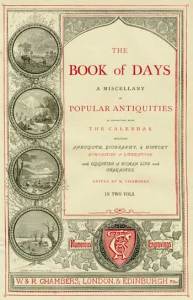 Whenever I’m at a loss for a topic for this blog, I take a peek at Hillman’s Hyperlinked and Searchable Chambers Book of Days. The Book of Days (or, if you like, the real title: The Book of Days: A Miscellany of Popular Antiquities in Connection with the Calendar, Including Anecdote, Biography, & History, Curiosities of Literature and Oddities of Human Life and Character) was published in 1832 by Robert Chambers, a prolific writer particularly known for his reference books.
Whenever I’m at a loss for a topic for this blog, I take a peek at Hillman’s Hyperlinked and Searchable Chambers Book of Days. The Book of Days (or, if you like, the real title: The Book of Days: A Miscellany of Popular Antiquities in Connection with the Calendar, Including Anecdote, Biography, & History, Curiosities of Literature and Oddities of Human Life and Character) was published in 1832 by Robert Chambers, a prolific writer particularly known for his reference books.
The Book of Days is arranged around the calendar, and contains interesting essays and trivia. The original work was printed in two volumes, each 840 pages long. It is an incredible feat of research.
Today’s date in the book contains who was born this date, who died, and the saint whose feast day it was. There was an essay about mermaids and about the “Circe of Carlyle House, Soho Street,” Teresa Cornelys. Mrs. Cornelys ran an upscale Assembly Room where great balls and masquerades were held.
The last essay of November 24 was this one:
THANKSGIVING DAY IN AMERICA
The great social and religious festival of New England, from which it has spread to most of the states of the American republic, is a legacy of the Puritans. They abolished Christmas as a relic of popery, or of prelacy, which they held in nearly equal detestation, and passed laws to punish its observance; but, wanting some day to replace it, the colonial assemblies, and, later, the governors of the states, appointed every year some day in autumn, generally toward the end of November, as a day of solemn prayer and thanksgiving for the blessings of the year, and especially the bounties of the harvest.
Thanksgiving day is always celebrated on Thursday, and the same day is chosen in most of the states. The governor’s proclamation appointing the day, is read in all the churches, and there are appropriate sermons and religious exercises. Families, widely scattered, meet at the bountiful thanksgiving dinners of roast turkeys, plum pudding, and mince and pumpkin pies. The evenings are devoted by the young people to rustic games and amusements.
The subjects of the thanksgiving-sermons are not infrequently of a political character, and in the chief towns of the union, those of the most popular preachers are generally published in the newspapers. The thanksgiving festival, though widely celebrated, is Not so universally respected as formerly, as the influx of Roman Catholics and Episcopalians has brought Christmas again into vogue, which is also kept by the Unitarians with considerable solemnity. As a peculiar American festival it will, however, long be cherished by the descendants of the Puritans.
Not a mention of shopping in Chambers’ essay. When you shop on Black Friday, don’t forget to put Megan’s The Duke’s Guide to Correct Behavior and Susanna’s A Christmas Reunion!
How many of you are planning plum pudding and an evening of rustic games and entertainments this Thursday?
Happy Thanksgiving!
